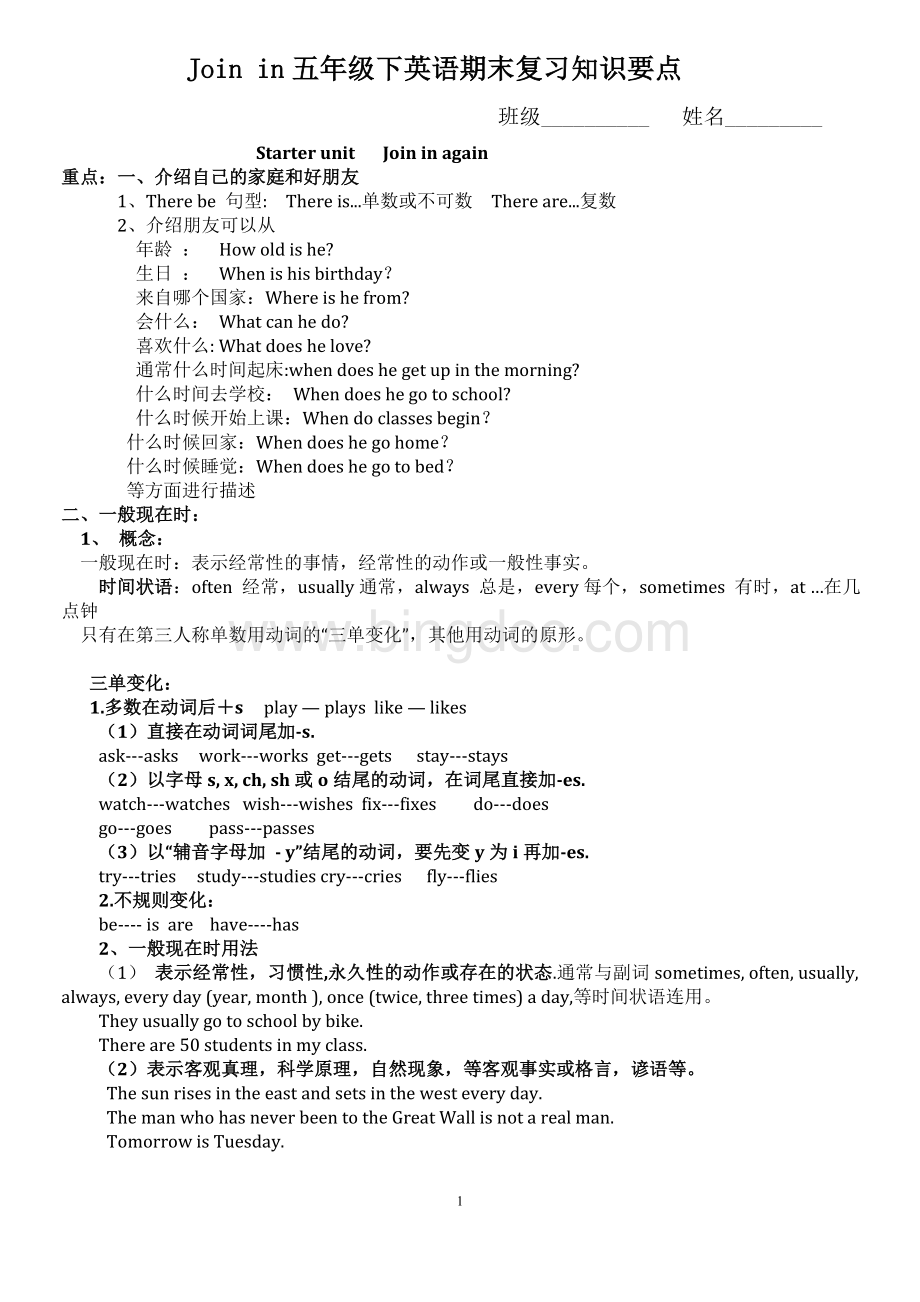《Join-In》五年级英语期末复习知识点Word文档格式.doc
《《Join-In》五年级英语期末复习知识点Word文档格式.doc》由会员分享,可在线阅读,更多相关《《Join-In》五年级英语期末复习知识点Word文档格式.doc(6页珍藏版)》请在冰点文库上搜索。

1、概念:
一般现在时:
表示经常性的事情,经常性的动作或一般性事实。
时间状语:
often经常,usually通常,always总是,every每个,sometimes有时,at…在几点钟
只有在第三人称单数用动词的“三单变化”,其他用动词的原形。
三单变化:
1.多数在动词后+s
play—plays
like—likes
(1)直接在动词词尾加-s.
ask---asks
work---works
get---gets
stay---stays
(2)以字母s,x,ch,sh或o结尾的动词,在词尾直接加-es.
watch---watches
wish---wishes
fix---fixes
do---does
go---goes
pass---passes
(3)以“辅音字母加-y”结尾的动词,要先变y为i再加-es.
try---tries
study---studiescry---cries
fly---flies
2.不规则变化:
be----is
are
have----has
2、一般现在时用法
(1)表示经常性,习惯性,永久性的动作或存在的状态.通常与副词sometimes,often,usually,always,everyday(year,month),once(twice,threetimes)aday,等时间状语连用。
Theyusuallygotoschoolbybike.
Thereare50studentsinmyclass.
(2)表示客观真理,科学原理,自然现象,等客观事实或格言,谚语等。
Thesunrisesintheeastandsetsinthewesteveryday.
ThemanwhohasneverbeentotheGreatWallisnotarealman.
TomorrowisTuesday.
3、一般现在时的句子转换:
(1)当句子中有be动词或情态动词时,则把be动词或情态动词(can,could等等)提到主语的前面变成疑问句;
在be动词或情态动词后面加not变成否定句.
例:
①陈述句:
Sheisastudent.
疑问句→Issheastudent?
否定句→Sheisnotastudent.
②陈述句:
Icanswim.
疑问句→Canyouswim
否定句→Icannotswim.
(2)
当句子中即没有be动词,也没有情态动词时,则在主语前加助动词do(you,以及复数),does(单数she,he,it)变成问句;
在主语后谓语动词前加助动词don’t(I,you,以及复数),doesn’t(单数she,he,it)变成否定句,助动词后的动词要变成动词原形。
例:
Wegetupat7:
00everymorning.
疑问句→Doyougetupat7:
00everymorning?
否定句→Wedon’tgetupat7:
Shehasalittlebrother.
疑问句→Doesshehavealittlebrother?
否定句→Shedoesn’thavealittlebrother.
Unit1Aphonecall
一:
重点单词
ask问mobilephone电话before在...之前ill生病的wrong错误的website网络film电影message信息photo照片collect收集
二:
重点词组
makephonecall打电话visitwebsites浏览网页
seefilms看电影getmessage收到短信
takephotos拍照collectstamps收集邮票
writeemails:
写邮件writeletters:
写信
doshopping购物waitamoment等一下
hurryup:
快点haveto:
不得不watchTVprogrammes看电视节目
三、重点句型
1.“打电话”一类:
A:
MayIspeaktoxxx?
回答:
Yes,youcan/Certainly,youcan...
B:
Whoisspeaking?
Thisisxxxspeaking.在电话中,如果想问对方是谁,可以这样说:
.如果想更客气一点的话,可以说:
MayIknowwhoisspeaking?
C:
Whoisthat?
那是谁?
因为不知道对方是男是女,所以只能用this,客观来表达,Thisisxxxspeaking.
2、Myfathercollectsstamps.
第三人称单数he、she、it之后接的动词会相应变化,如常见的havegot改为hasgot,like改为likes,do改为does,go改为goes.
havegot“有”,与have用法相同。
注意:
havegot变一般疑问句时只用将have提到主语前,而have变一般疑问句时应借助助动词do.
如:
Ihavegotabook.——Haveyougotabook?
Ihaveabook.——Doyouhaveabook?
3.-Whatcanyoudowithamobilephone?
-Icansendandgetmessages.(我可以发送和接收短信)
情态动词can用来描述自己的能力,其后接动词原形。
Icansing.Shecandance.Hecanflyakite.
4、Hereyouare.给你。
用于递给某人东西时使用。
5、whatcanIdo?
我能做什么呢?
6、Canyouhelpme?
你能帮我吗?
常用来向别人寻求帮助时。
Unit2LifeintheArctic
一、重点单词
北极NorthPole南极SouthPole北极熊polarbear地球earth
野兔hare湖lake早期地early爷爷grandad奶奶grandma
海豹seal雪snow小山hill冰ice拉pull无聊的boring
二、重点短语
gototheArctic去北极catchahare抓野兔jumpinthewater跳进水里swimacrossalake游过湖泊walkthroughthesnow穿过雪runupthehill爬上山
cometoastop停止lookaround朝四周看gofishing去钓鱼
三.重点句型
1、It’salwaysdark.天总是黑的。
2、WhereistheArctic?
Where“哪里”用来询问地点
3、What’soverthere?
用来询问远处的某物是什么。
回答可用:
Itis+....也可省略Itis
直接做答
4、What’shedoingoverthere?
此句为现在进行时的特殊疑问句,常用来询问某人正在做什么,回答也应该用现在进行时。
如:
He’ssinging.
5、Doyoulike……?
6、WhatcanIdo?
It’salwaysdark.
7、Wasn’titboring?
难道不无聊吗?
词句为反问句,常希望得到别人的肯定答复。
8、Whatwillyoudotomorrow?
I’llgoswimming.
四、语法:
一般将来时
概念:
表示将要发生的动作或存在的状态及打算、计划或准备做某事。
时间状语:
tomorrow,nextday(week,month,year…),soon,thedayaftertomorrow(后天)等。
基本结构①begoingto+do②will+do
Iamgoingtohaveapicnictomorrow.
Thechildrenaregoingtohaveasportsmeetingnextweek.
Tomwill/isgoingtoseeaplaywithhisfatherthisevening.
否定句
在be动词(am,is,are)后加not或情态动词will后加not或直接用won’t。
Iamnotgoingtohaveapicnictomorrow.
Thechildrenarenotgoingtohaveasportsmeetingnextweek.
Tomwillnot/isnotgoingtoseeaplaywithhisfatherthisevening.
★肯定回答及否定回答
Yes,Iwill./No,Iwillnot.
Yes,theywill./No,theywillnot.
Yes,hewill./No,hewillnot.
★变疑问句将助动词移到句首
Areyougoingtohaveapicnictomorrow?
Arethechildrengoingtohaveasportsmeetingnextweek?
WillTomseeaplaywithhisfatherthisevening?
★特殊疑问句Whatwillyoudo?
Unit3Television
一、重点单词
call名叫叫做different不同的
interesting有趣的boring无聊的stupid愚蠢的
star明星usually通常的while一段时间want想要
cartoon卡通片detectivefilms侦探片romanticfilms爱情片
natureprogrammes自然节目sportsprogrammes体育节目
sciencefictionfilms科幻片
1、isshortfor:
........的缩写
如:
TVisshortforTelevision.
USAisshortforUnitedStatesofAmerican.
2、different不同的same相同的
Alwaysusuallyoftensometimesnever
3、like喜欢,后常接名词,动名词来表示喜欢的东西。
Ilikecandy.Ilikeswimming.
4、时间介词:
at,on,in
5、beon上演;
播放
6、switchon打开=turnon
7、onTV在电视上
8、Thousandsof成千上万,表示不确切的数字
如果表示具体数字时,不能加“s”。
twothousandstudents
9、Hedoesn’tlikesweetslikeyouandme.两个like的意思不同,一个是喜欢,一个是像。
1、DoyouoftenwatchTV?
DoessheoftenwatchTV?
2、Whatprogrammesdoyouoftenwatch?
3、Whatdoyoulike?
Whatdoesshelike?
Doesshelike…?
6、Whataboutyou?
7、WhendoseManandNaturebegain?
Itbeginsattwentypastfour.
Unit4Intown
一.重点单词及短语
beside在…旁边left向左right向右straight笔直的
opposite在…对面nextto紧挨着on在late晚的迟的
hospital医院museum博物馆park公园church教堂trainstation火车站
busstop公共汽车站postoffice邮政局policestation警察局
touristoffice旅游信息咨询处
二.重点句型
1.如何问路
Excuseme?
Where’sthe…?
2.如何回答
It’soppositethepark/nexttotheschool/behindthepark/besidetheschool.
Firstgoleft,thengostraightahead,thenturnright.
Unit5Onthebeach
一.重点单词
cloudy多云的windy风大的sunny阳光充足的raining下雨的
fine晴朗的baby幼兽boat船call给…打电话city城市
close接近的hurt受伤的island岛屿rock岩石too太tourist游客
二.重点短语
haveagreattime玩得开心flyakite放风筝
rideahorse骑马listentomusic听音乐
playfootball踢足球collectshells搜集贝壳
swiminthesea在海里游泳rideajet-ski开喷气式划艇
gosnorkeling徒手潜水passby经过(某人/某事物)
三,重点句式
1.Whereis…?
…在哪里?
2.问天气:
What’stheweatherlike?
How’stheweather?
——It’sfine/sunny/cloudy/windy.
3.时间+later…之后
halfanhourlater半小时后twomonthslater两个月后
4.There’sasealontherockoverthere.It’sbadlyhurt.
那边有只海豹在石头上,它受了重伤。
5.Youcannotswimthereveryoften.你不能常在那里游泳。
Youcanswimheremostoftheyear.你可以常年在那游泳。
四.语法:
现在进行时
现在进行时表示此时此刻、现阶段正在进行或发生的动作,动词用现在分词。
now,rightnow,atthemoment,thesedays
基本结构:
be+v-ing
Iamlisteningtomusicnow.
Thechildrenareplayingbasketballnow.
Sheissleepingnow.
否定句:
在be动词(am,is,are)后加not.
★变疑问句将be移到句首
Areyouplayingcomputergames?
Aretheyworking?
Issheflyingakite?
★特殊疑问句WhatisSusandoingnow?
现在分词的变化规则
1一般情况直接在单词后加ing
Ride—ridingfly–flyingeat-eating
fish–fishingwatch–watchinglisten-listening
do–doinggo-goingplay–playing
sing-singinglearn-learningsnorkel-snorkeling
2以e结尾的开音节去掉e再加ing
ride-ridingmake-makingtake-takingdance-dancingwrite-writing
3重读闭音节双写再加ing
run-runningswim-swimmingput-puttingstop-stoppingshop-shopping
Unit6Adventures
一.重点单词
Afraid害怕ago以前alone独自last最后的ride骑short矮的soup汤strong健壮的thin瘦的worry担心
beafraidof害怕beproudof以…为傲lookfor寻找
Puton穿上,戴上takeoff脱下geton上车getoff下车
worryabout担心begoodat擅长makesomepancakes做些煎饼
sleepingalone自己睡bankrobber银行盗贼handsup举起手来bornto出生于climbupmountains登高山liveinthejungle住在丛林gotoSouthPole去南极liveinthedesert住在沙漠sailacrosstheAtlantic穿越大西洋flytothemoon飞向月球stopcrying停止哭泣
三 重点句型
1.I’mnotafraidof+n/doingsth
Thedark/bigdogs/thecold/spiders/rats/hotfood/horrorfilms/sleepingalone
表示我不害怕某物或我不害怕做某事。
ThereisonethingI’mafraidof有一件事我害怕
Areyouafraidofdoingsth?
你害怕干某事吗?
2.I’mlookingforbankrobbers.我正在寻找银行盗贼。
3.CanIsingalastsong,please?
请问我可以唱最后一首歌吗?
4.CanIhelpyouwiththepancakes?
我可以帮你们做煎饼吗?
5.tenyearsago十年前时间+ago…以前一般用在过去时态
be动词的一般过去时
•概念:
be动词的一般过去时表示过去某个时间存在的状态,
•时间状语:
通常和ago,last,yesterday,thedaybeforeyesterday,justnow,amomentago或者具体的过去的日期、年代连用。
•一般过去时中主语是第一人称或者第三人称单数、名词的单数形式时,谓语动词用was。
当主语是第二人称或者复数形式时,谓语动词用were。
•Be动词一般过去时肯定句:
•主语+be动词(was/were)+其他
•Hewasafraidofdogs.他以前害怕狗。
•Theyweremyfriends.他们以前和我是朋友。
•Be动词一般过去时的否定句:
•主语+be动词(was/were)+not+其他
•Iwasnotathomelastnight.我昨天晚上不在家。
Hewasnotshortatyourage.他在你那么大的时候并不矮。
Myparentswerenot(=weren'
t)athomelastSunday.上周日我父母不在家。
Be动词一般过去时的一般疑问句:
•Be动词(was/were)+主语+其他+?
Washeinthezoo?
他在动物园吗?
Wereyouintheplaygroundjustnow?
你们刚才在操场吗?
•Be动词一般过去时的特殊疑问句:
•特殊疑问词+be动词(was/were)+主语+其他+?